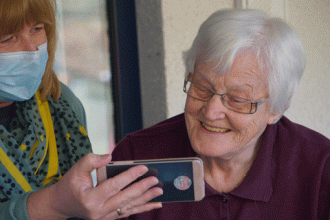How can we age smarter and healthier?
ToggleHow can we age smarter and healthier?
The use of innovative technology can improve the daily health and wellbeing of older people, writes Niamh Redmond, Dr Michael Cooke and Prof Mac MacLachlan, All Institute

In 2017, the ERSI published a report stating that the number of people in Ireland aged over 85 is projected to double between 2015 and 2030. While these figures are in line with our EU counterparts, Ireland has one advantage: we have currently one of the slowest ageing populations in Europe.
We now have opportunities to learn from the significant challenges older people faced during the Covid-19 pandemic. In an age where technology is constantly evolving, we must examine how we can utilise simple and innovative digital solutions to improve the daily lives of older people. The Maynooth University-led Smart and Health Ageing through People Engaging in supportive Systems (SHAPES) project aims to bring together a wide range of digital solutions focused on improving the health, wellbeing, and independence of people as they get older. Here are some examples of simple but powerful solutions which have been implemented out of necessity during the pandemic.
Fewer hospital visits
Over the last seven months, the number of virtual clinics has expanded considerably throughout the HSE. Virtual clinics can save older people time and expense in travelling to hospitals for appointments and also reduce their risk of infection.
However, there is a need to improve digital literacy amongst older people so they can get the full benefit of these new services. One positive reverberation of the pandemic is that digital literacy has risen amongst this age group with many families purchasing tablets or smartphones for parents and grandparents as a means to stay connected throughout lockdowns. This has resulted in many older people taking part in a plethora of activities ranging from virtual quiz nights to family video calls.
Connecting with communities
One of the major goals of Ireland's ambitious Sláintecare programme is to improve care for older people by providing it "as close to home as possible". This means a focus on developing community-based supports so older people can retain their independent lives at home. In the SHAPES project, Irish company Access Earth has developed an app which provides details on the levels of accessibility in local areas, such as cafes, restaurants and shops, and can provide older people with a better understanding of accessible and age friendly environments in their own areas. The project is also improving the use of communicative technologies, such as screen magnifiers, screen readers and Braille devices, by developing apps that make access to them easier for older people.
A daily check-in
To help people remain safe and well living within their communities, SHAPES will use digital solutions to reduce the risks of injury, frailty and long-term chronic diseases. Small wearable devices can monitor a person’s health condition, collecting information on physiological functioning and the correct use of medicines. They can also help with the early identification of side effects, providing important opportunities to adjust medicines and treatments early, so that they do not result in hospitalisation. Simple features like a device that is worn and vibrates can remind people when a medicine should be taken. Solutions that assist in these activities will be piloted in the project by the Northern Ireland Health and Social Care Trust in Co. Antrim.
Listen to older people
To make sure our solutions will solve real and meaningful problems, the starting point of the project is about understanding the everyday needs of older people and empowering them to make decisions which are optimal for them personally. We start with people’s lives, not the technology. We ask how the broader ecosystem in which they live can be supported and even improved, through providing opportunities to use particular types of technologies.
Over 2,000 older people across the EU will be piloting new and innovative technology to allow people to continue living where they want to and in the communities that bind them together with friends and family.
The ALL (Assisting Living & Learning) Institute launched the SHAPES project, a €21 million European Commission funded health research project – the largest ever Horizon 2020 health grant led by an Irish university. The project has launched the first of three open calls inviting SMEs and all EU organisations that are eligible for EC funding, to meet active healthy ageing and independent living challenges with innovative digital solutions that can be integrated in the #SHAPESH2020 Platform https://t.co/BBO7hThzRg
